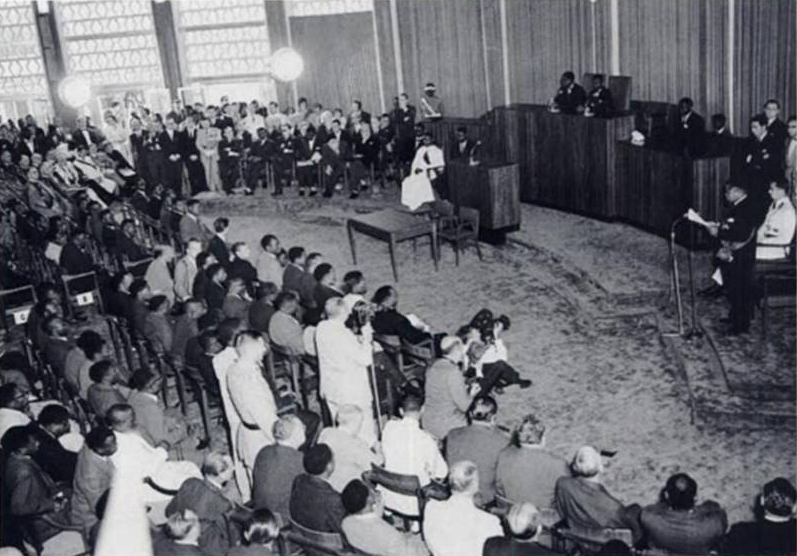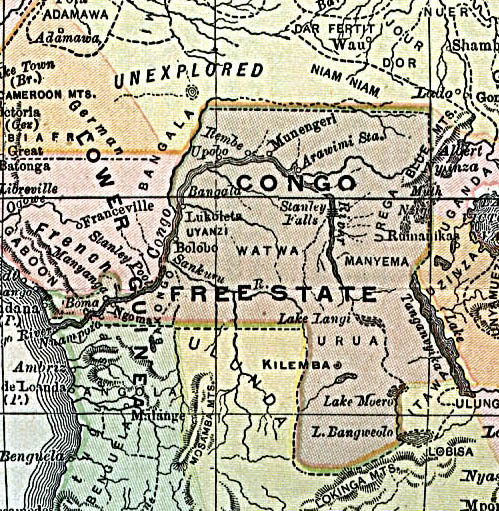|
Congolese Independence Speech
The Speech at the Ceremony of the Proclamation of the Congo's Independence was a short political speech given by Patrice Lumumba on 30 June 1960 at the ceremonies marking the independence of the Republic of Congo (the modern-day Democratic Republic of the Congo) from Belgium. It is best known for its outspoken criticism of colonialism. Lumumba, the first Congolese Prime Minister, gave the address during the official independence commemorations at the ''Palais de la Nation'' in Léopoldville (modern-day Kinshasa). The ceremony was intended to mark the harmonious end of Belgian rule and was attended by both Congolese and Belgian dignitaries, including King Baudouin. Lumumba's speech, which was itself unscheduled, was in large part a response to Baudouin's speech which argued that the end of colonial rule in the Congo had been depicted as the culmination of the Belgian "civilising mission" begun by Leopold II in the Congo Free State. Lumumba's speech, broadcast live on the radio ... [...More Info...] [...Related Items...] OR: [Wikipedia] [Google] [Baidu] |
Congopresse 4
Congopresse was a photographic agency active in the Belgian Congo and in the early years of the Republic of the Congo. History Congopresse was founded in 1947, under the aegis of the Belgian colonial administration's Centre d'information et de documentation du Congo belge et du Ruanda-Urundi. The agency served was the main source of documentary photography and photojournalism from Congo in the 1950s, as foreign press rarely traveled to the Congo or took their own photographs there. The photos were sent to Brussels where the Ministry of Colonies compiled, edited, and disseminated them as propaganda. Congopresse largely relied on European photographers in its early years. Joseph Makula was hired as its first Congolese photographer in 1956. The European staff all left at independence, and in the 1960s Makula trained a new generation of Congolese photographers to replace them,Lye Mudaba Yoka, ''Photographes de Kinshasa'', (Revue Noire, 2001), p. 65.Christraud M. Geary, ''In and O ... [...More Info...] [...Related Items...] OR: [Wikipedia] [Google] [Baidu] |
African Nationalism
African nationalism is an umbrella term which refers to a group of political ideologies in sub-Saharan Africa, which are based on the idea of national self-determination and the creation of nation states.African nationalism The ideology emerged under European colonial rule during the 19th and 20th centuries and was loosely inspired by nationalist ideas from Europe. Originally, African was based on demands for self-determination and played an important role in forcin ... [...More Info...] [...Related Items...] OR: [Wikipedia] [Google] [Baidu] |
World War II
World War II or the Second World War, often abbreviated as WWII or WW2, was a world war that lasted from 1939 to 1945. It involved the vast majority of the world's countries—including all of the great powers—forming two opposing military alliances: the Allies and the Axis powers. World War II was a total war that directly involved more than 100 million personnel from more than 30 countries. The major participants in the war threw their entire economic, industrial, and scientific capabilities behind the war effort, blurring the distinction between civilian and military resources. Aircraft played a major role in the conflict, enabling the strategic bombing of population centres and deploying the only two nuclear weapons ever used in war. World War II was by far the deadliest conflict in human history; it resulted in 70 to 85 million fatalities, mostly among civilians. Tens of millions died due to genocides (including the Holocaust), starvation, ma ... [...More Info...] [...Related Items...] OR: [Wikipedia] [Google] [Baidu] |
Racial Segregation
Racial segregation is the systematic separation of people into race (human classification), racial or other Ethnicity, ethnic groups in daily life. Racial segregation can amount to the international crime of apartheid and a crimes against humanity, crime against humanity under the Statute of the International Criminal Court. Segregation can involve the wikt:spatial, spatial separation of the races, and mandatory use of different institutions, such as schools and hospitals by people of different races. Specifically, it may be applied to activities such as eating in restaurants, drinking from water fountains, using public toilets, attending schools, going to films, riding buses, renting or purchasing homes or renting hotel rooms. In addition, segregation often allows close contact between members of different racial or ethnic groups in social hierarchy, hierarchical situations, such as allowing a person of one race to work as a servant for a member of another race. Segregation i ... [...More Info...] [...Related Items...] OR: [Wikipedia] [Google] [Baidu] |
Indirect Rule
Indirect rule was a system of governance used by the British and others to control parts of their colonial empires, particularly in Africa and Asia, which was done through pre-existing indigenous power structures. Indirect rule was used by various colonial rulers: the French in Algeria and Tunisia, the Dutch in the East Indies, the Portuguese in Angola and Mozambique and the Belgians in Rwanda and Burundi. These dependencies were often called "protectorates" or "trucial states". By this system, the day-to-day government and administration of areas both small and large were left in the hands of traditional rulers, who gained prestige and the stability and protection afforded by the Pax Britannica (in the case of British territories), at the cost of losing control of their external affairs, and often of taxation, communications, and other matters, usually with a small number of European "advisors" effectively overseeing the government of large numbers of people spread over extensive ... [...More Info...] [...Related Items...] OR: [Wikipedia] [Google] [Baidu] |
Economic Specialization
The division of labour is the separation of the tasks in any economic system or organisation so that participants may specialise (specialisation). Individuals, organizations, and nations are endowed with, or acquire specialised capabilities, and either form combinations or trade to take advantage of the capabilities of others in addition to their own. Specialised capabilities may include equipment or natural resources as well as skills, and training and combinations of such assets acting together are often important. For example, an individual may specialise by acquiring tools and the skills to use them effectively just as an organization may specialise by acquiring specialised equipment and hiring or training skilled operators. The division of labour is the motive for trade and the source of economic interdependence. Historically, an increasing division of labour is associated with the growth of total output and trade, the rise of capitalism, and the increasing complexity of ... [...More Info...] [...Related Items...] OR: [Wikipedia] [Google] [Baidu] |
Privately Held Company
A privately held company (or simply a private company) is a company whose shares and related rights or obligations are not offered for public subscription or publicly negotiated in the respective listed markets, but rather the company's stock is offered, owned, traded, exchanged privately, or Over-the-counter (finance), over-the-counter. In the case of a closed corporation, there are a relatively small number of shareholders or company members. Related terms are closely-held corporation, unquoted company, and unlisted company. Though less visible than their public company, publicly traded counterparts, private companies have major importance in the world's economy. In 2008, the 441 list of largest private non-governmental companies by revenue, largest private companies in the United States accounted for ($1.8 trillion) in revenues and employed 6.2 million people, according to ''Forbes''. In 2005, using a substantially smaller pool size (22.7%) for comparison, the 339 companies on ... [...More Info...] [...Related Items...] OR: [Wikipedia] [Google] [Baidu] |
Christianity
Christianity is an Abrahamic monotheistic religion based on the life and teachings of Jesus of Nazareth. It is the world's largest and most widespread religion with roughly 2.38 billion followers representing one-third of the global population. Its adherents, known as Christians, are estimated to make up a majority of the population in 157 countries and territories, and believe that Jesus is the Son of God, whose coming as the messiah was prophesied in the Hebrew Bible (called the Old Testament in Christianity) and chronicled in the New Testament. Christianity began as a Second Temple Judaic sect in the 1st century Hellenistic Judaism in the Roman province of Judea. Jesus' apostles and their followers spread around the Levant, Europe, Anatolia, Mesopotamia, the South Caucasus, Ancient Carthage, Egypt, and Ethiopia, despite significant initial persecution. It soon attracted gentile God-fearers, which led to a departure from Jewish customs, and, a ... [...More Info...] [...Related Items...] OR: [Wikipedia] [Google] [Baidu] |
Government
A government is the system or group of people governing an organized community, generally a state. In the case of its broad associative definition, government normally consists of legislature, executive, and judiciary. Government is a means by which organizational policies are enforced, as well as a mechanism for determining policy. In many countries, the government has a kind of constitution, a statement of its governing principles and philosophy. While all types of organizations have governance, the term ''government'' is often used more specifically to refer to the approximately 200 independent national governments and subsidiary organizations. The major types of political systems in the modern era are democracies, monarchies, and authoritarian and totalitarian regimes. Historically prevalent forms of government include monarchy, aristocracy, timocracy, oligarchy, democracy, theocracy, and tyranny. These forms are not always mutually exclusive, and mixed govern ... [...More Info...] [...Related Items...] OR: [Wikipedia] [Google] [Baidu] |
Belgian Congo
The Belgian Congo (french: Congo belge, ; nl, Belgisch-Congo) was a Belgian colony in Central Africa from 1908 until independence in 1960. The former colony adopted its present name, the Democratic Republic of the Congo (DRC), in 1964. Colonial rule in the Congo began in the late 19th century. King Leopold II of the Belgians attempted to persuade the Belgian government to support colonial expansion around the then-largely unexploited Congo Basin. Their ambivalence resulted in Leopold's establishing a colony himself. With support from a number of Western countries, Leopold achieved international recognition of the Congo Free State in 1885. By the turn of the century, the violence used by Free State officials against indigenous Congolese and a ruthless system of economic exploitation led to intense diplomatic pressure on Belgium to take official control of the country, which it did by creating the Belgian Congo in 1908. Belgian rule in the Congo was based on the "colonial tr ... [...More Info...] [...Related Items...] OR: [Wikipedia] [Google] [Baidu] |
Atrocities In The Congo Free State
In the period from 1885 to 1908, many well-documented atrocities were perpetrated in the Congo Free State (today the Democratic Republic of the Congo) which, at the time, was a State (polity), state under the absolute rule of Leopold II of Belgium, King Leopold II of the Belgians. These atrocities were particularly associated with the labour policies used to collect natural rubber for export. Together with epidemic disease, famine, and a falling birth rate caused by these disruptions, the atrocities contributed to a sharp decline in the Congolese population. The magnitude of the population fall over the period is disputed, with modern estimates ranging from 1.5 million to 13 million. At the Berlin Conference of 1884–1885, the European powers allocated most of the Congo Basin region to a supposedly philanthropic organisation run by Leopold II, who had long held ambitions for colonial expansion. The territory under Leopold's control exceeded ; amid financial problems, it was dir ... [...More Info...] [...Related Items...] OR: [Wikipedia] [Google] [Baidu] |





.jpg)
